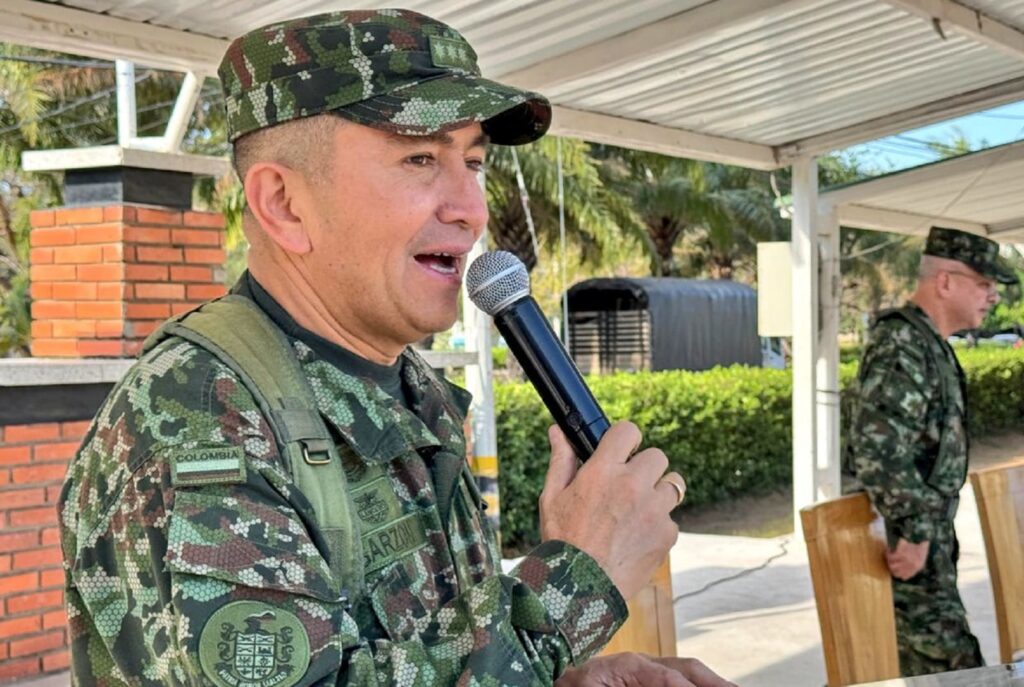
The president of Colombia, Gustavo Petro, removed General Hernando Garzon Rey from active service over alleged links to drug trafficking. The decision, announced by the president through his X account, came after the collection of complaints and pieces of evidence that, it is claimed, were handed over to the Prosecutor’s Office to carry out the corresponding investigation.
The dismissal unleashes a new political storm in Colombia, since the general served as inspector general of the Joint Command of the Armed Forces, a position of high responsibility in the supervision and internal control of the institution. In addition, he has a record of military decorations for merit during more than 30 years of service.
Colombia’s Petro removes general over alleged links to drug trafficking
Gustavo Petro announced on Wednesday, Sept. 10, the dismissal of General Hernando Garzon Rey, investigated for alleged links to the illegal cultivation of coca leaf and drug trafficking activities.
The officer, who until the time of his removal served as inspector of the Joint Command of the Armed Forces, had been appointed to that post in March of this year, placing him among the most powerful figures within the military hierarchy.
It is reported that the investigation that led to this decision was largely carried out by Colombia’s National Intelligence Directorate (DNI) and counterintelligence.
“I have removed Major General Hernando Garzon Rey from active service in the armed forces due to strong indications of association with drug trafficking groups and coca leaf cultivation. The complaints and indications are being handed over to the Prosecutor’s Office so it can conduct its proper investigation,” the president wrote last night on his X account.
He retirado del servicio activo de las fuerzas militares al mayor general Hernando Garzón Rey; por los fuertes indicios de asociación con grupos narcotraficantes y cultivo de hoja de coca.
Se entrega a la fiscalía las denuncias e indicios para que haga su investigación de…
— Gustavo Petro (@petrogustavo) September 11, 2025
Hernando Garzon Rey, a three-decade service record tainted by drug trafficking suspicions
Hernando Garzon Rey is a highly recognized military officer in Colombia. With studies in military sciences, a Master’s degree in international relations from the Autonomous University of Barcelona, specializations in military resource management and a Master’s in national security and defense, as well as training in command and general staff, Garzon’s academic background goes beyond his strictly military education.
Likewise, his professional career spans more than 30 years of service in the Colombian Army, where he held key positions in the fight against drug trafficking and transnational crime.
Among his most recent functions stands out his command of Joint Command No. 5 Northwest since October 2023, coordinating more than 30,000 troops from the three branches of the armed forces. In addition, he recently served as deputy commander of the U.S. Army South in San Antonio, Texas.
Nevertheless, the officer’s record is not without controversy. In 2019, when he held the rank of colonel, he was reported by Army Captain Maritza Soto for alleged workplace harassment, sexual harassment, and abuse of authority, allegedly taking advantage of his hierarchy and position of command within the armed forces.
His removal now, urgently forced by President Petro, responds to the seriousness of the evidence that, according to the government, weighs on these alleged links with drug trafficking activities by the prominent general.
The long shadow of drug trafficking in Colombia
Throughout Colombian history, the armed forces have been central in the fight against drug trafficking, although they have also faced specific accusations of involvement, backed by judicial convictions.
An emblematic case, widely documented by the courts, is that of former Colonel Byron Carvajal. In 2008, he was initially sentenced to 54 years in prison for his responsibility in the Jamundi massacre, which occurred in May 2006, when his troops from the High Mountain Battalion ambushed and killed 10 Dijin agents and a civilian, in what was determined to be an operation coordinated with drug traffickers. Later, in 2016, the Supreme Court of Justice upheld a 26-year and two-month sentence for drug trafficking: he had ordered a “switch” of 13 kilos of cocaine seized in an operation in Jamundi.
Other documented cases have involved lower-ranking officers or local contexts, revealing how drug trafficking has managed to infiltrate certain levels of the state apparatus. Despite these episodes, the armed forces continue to carry out key operations against drug trafficking and illegal armed groups, although public trust has been undermined by proven cases of corruption.
Carvajal’s case is not anecdotal but paradigmatic of a structural problem: the need to strengthen internal controls, transparency, and accountability in institutions that are supposed to guarantee order and legality.
It also illustrates the ability of drug trafficking criminal gangs to permeate the structures of the state, as Colombia was able to verify in the “narco-politics” scandals, especially during the 1990s, which reached the highest levels of the Colombian State — including the presidency — according to FBI and CIA reports.

See all the latest news from Colombia and the world at ColombiaOne.com. Contact our newsroom to report an update or send your story, photos and videos. Follow Colombia One on Google News, Facebook, Instagram, TikTok and subscribe here to our newsletter.


